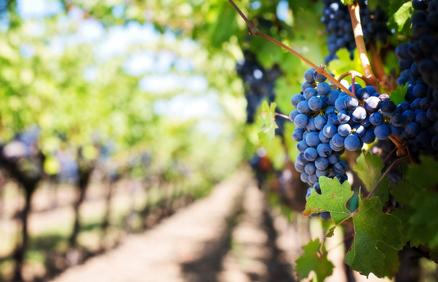Separating terumot and ma'aserot from grapes in Mitzpe Ramon

This abstract discusses if one always needs to separate terumot in ma'aserot in Mitzpe Ramon? And what about the blessings?
Mitzpe Ramon, situated in Southern Israel, is certainly considered part of the Land of Israel; however, there is doubt whether it is included in the borders of olei Mitzrayim, or only part of the borders of the Land promised to Avraham Avinu, gevulot hahavtacha. The significance here, among other things, is in relation to the obligation to separate terumot and ma'aserot. Within the olei Mitzrayim borders we separate terumot and ma'aserot with a blessing only on dagan, tirosh, and yitzhar (grains, grape juice/wine, and olive oil), for which the obligation to separate terumot and ma'aserot is biblical; for fruit and vegetables, however, we separate terumot and ma'aserot without a blessing. The question, then, is: what is the halacha regarding grapes grown in Mitzpe Ramon?
The common denominator for dagan, tirosh, and yitzhar is the importance of the final product: from dagan, grains, we mill flour; we produce wine from grapes; and olive oil from olives. The question then becomes if the biblical obligation for terumot and ma'aserot applies also to grapes, and not just to wine, and likewise to olives, and not just to oil. There is a dispute among the Rishonim on this matter, but in practice we hold that grapes and olives are also subject to a biblical obligation to separate terumot and ma'aserot. Nevertheless, because at Mitzpe Ramon there are other halachic uncertainties as well—it might not be included in the borders of olei Mitzrayim, rather only gevulot hahavtacha—in practice we separate terumot and ma'aserot from grapes grown there without a blessing.
In conclusion: in Mitzpe Ramon, terumot and ma'aserot are to be separated from grapes, but without a blessing.
For the full article, see here.




